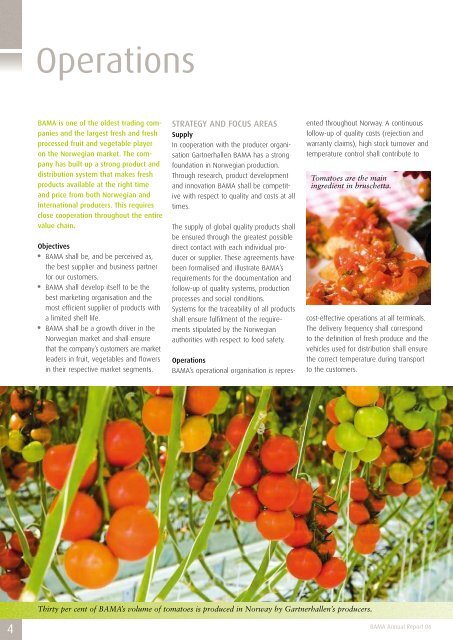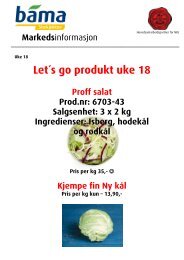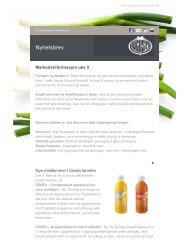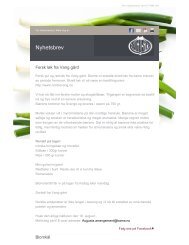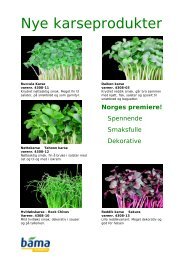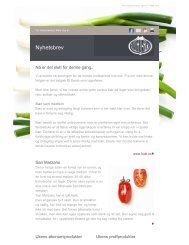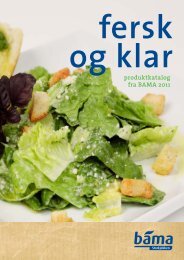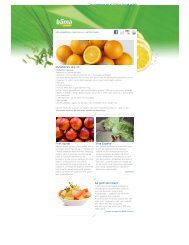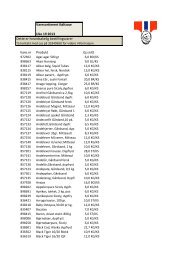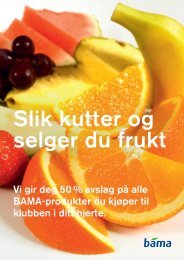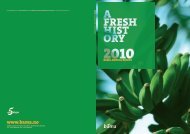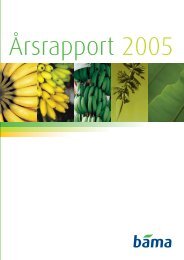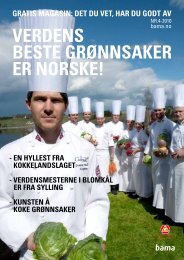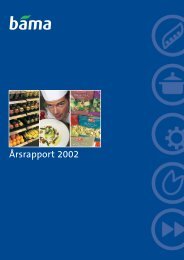380000 tonnes fresh products - Bama
380000 tonnes fresh products - Bama
380000 tonnes fresh products - Bama
- No tags were found...
Create successful ePaper yourself
Turn your PDF publications into a flip-book with our unique Google optimized e-Paper software.
2006 History<br />
Operations<br />
BAMA is one of the oldest trading companies<br />
and the largest <strong>fresh</strong> and <strong>fresh</strong><br />
processed fruit and vegetable player<br />
on the Norwegian market. The company<br />
has built up a strong product and<br />
distribution system that makes <strong>fresh</strong><br />
<strong>products</strong> available at the right time<br />
and price from both Norwegian and<br />
international producers. This requires<br />
close cooperation throughout the entire<br />
value chain.<br />
Objectives<br />
• BAMA shall be, and be perceived as,<br />
the best supplier and business partner<br />
for our customers.<br />
• BAMA shall develop itself to be the<br />
best marketing organisation and the<br />
most efficient supplier of <strong>products</strong> with<br />
a limited shelf life.<br />
• BAMA shall be a growth driver in the<br />
Norwegian market and shall ensure<br />
that the company’s customers are market<br />
leaders in fruit, vegetables and flowers<br />
in their respective market segments.<br />
Strategy and focus areas<br />
Supply<br />
In cooperation with the producer organisation<br />
Gartnerhallen BAMA has a strong<br />
foundation in Norwegian production.<br />
Through research, product development<br />
and innovation BAMA shall be competitive<br />
with respect to quality and costs at all<br />
times.<br />
The supply of global quality <strong>products</strong> shall<br />
be ensured through the greatest possible<br />
direct contact with each individual producer<br />
or supplier. These agreements have<br />
been formalised and illustrate BAMA’s<br />
requirements for the documentation and<br />
follow-up of quality systems, production<br />
processes and social conditions.<br />
Systems for the traceability of all <strong>products</strong><br />
shall ensure fulfilment of the requirements<br />
stipulated by the Norwegian<br />
authorities with respect to food safety.<br />
Operations<br />
BAMA’s operational organisation is represented<br />
throughout Norway. A continuous<br />
follow-up of quality costs (rejection and<br />
warranty claims), high stock turnover and<br />
temperature control shall contribute to<br />
Tomatoes are the main<br />
ingredient in bruschetta.<br />
cost-effective operations at all terminals.<br />
The delivery frequency shall correspond<br />
to the definition of <strong>fresh</strong> produce and the<br />
vehicles used for distribution shall ensure<br />
the correct temperature during transport<br />
to the customers.<br />
Market<br />
BAMA shall be a category developer and<br />
driver for its customers. The company<br />
shall be a leading player for the product<br />
development of <strong>fresh</strong> and processed fruits<br />
and vegetables, and develop and adapt<br />
individual chain concepts for all customer<br />
segments. With a strong focus on the<br />
entire value chain and a result-oriented<br />
attitude, BAMA will be a guarantor of<br />
profitability for its customers.<br />
Corporate social responsibility<br />
Through a comprehensive focus on the<br />
entire value chain, in both a local and<br />
global perspective, BAMA shall be able<br />
to document the measures implemented<br />
by the company to improve the environment.<br />
BAMA shall also ensure that the adopted<br />
guidelines for ethical trading, especially<br />
with respect to third world countries, are<br />
observed at all times by our suppliers and<br />
in our own system. n<br />
• Growth in the consumption of fruit and<br />
vegetables continued in 2006. BAMA’s<br />
development shows a combined growth<br />
in volume of 4.5 per cent.<br />
• The NRK programme “Brennpunkt”<br />
discussed the ethical message BAMA<br />
used in parts of its Bend-it Campaign<br />
in 2005. The Consumer Council of<br />
Norway followed up this matter and<br />
came to the conclusion that this type<br />
of marketing was in violation of the<br />
Marketing Act. BAMA took this matter<br />
very seriously.<br />
• After a process of several years, BAMA<br />
signed the agreement that secures<br />
a central property at Nyland Syd in<br />
Groruddalen for the company. The study<br />
phase with respect to utilisation of the<br />
property has started.<br />
• BAMA entered into an agreement<br />
for the sale of its ownership interest<br />
in Gro Industrier to Findus Norge AS.<br />
The Norwegian Competition Authority<br />
approved the transaction in May 2007.<br />
• BAMA entered into an agreement with<br />
Synnøve Finden ASA for the repurchase<br />
of all shares in Nordic Lunch AS. The<br />
acquisition is expected to provide<br />
considerable synergies in the service<br />
market.<br />
• In 2006 BAMA strengthened its focus<br />
on corporate social responsibility by<br />
developing its own strategy and<br />
establishing a separate department for<br />
this area.<br />
• The cooperation agreements with<br />
the Football Association of Norway and<br />
the Norwegian Biathlon Federation was<br />
renewed.<br />
• During the year, over 30,000 children<br />
and young people participated in 50<br />
sports events sponsored by BAMA,<br />
where the importance of physical<br />
activity and a proper diet was stressed.<br />
• A pilot project was launched with the<br />
intention of providing employees an<br />
opportunity to improve their quality of<br />
life by focusing on a better diet,<br />
physical training and mental health.<br />
1886 - Established as a timber business by<br />
founder Christian Marius Emil Matthiessen.<br />
1905 - Contracts signed for the delivery of<br />
wooden crates for the transport of bananas in<br />
England and import of bananas to Scandinavia.<br />
The first bananas arrived in Norway.<br />
1915 - Banana imports showed strong growth.<br />
Branch offices established in key cities. “Banana<br />
Matthiessen” became a popular expression.<br />
1920 - Banana imports were liberalised in<br />
1919. The company expanded greatly and<br />
the capacity of the ripening rooms in the<br />
Stiftsgården and Statholdergården buildings in<br />
Oslo was bursting at the seams.<br />
1930 - Fyffes bananas was a brand in great<br />
demand and a new and modern ripening<br />
facility was completed at Filipstadkaia in Oslo.<br />
1940 - All fruit and vegetable imports stopped<br />
during the war. The new ripening facility at<br />
Filipstad was destroyed by an explosion in 1943.<br />
1950 - Foreign currency restrictions introduced<br />
and Norway was without bananas from 1947.<br />
Other product categories were traded. The market<br />
balance was restored in 1957. Other tropical<br />
<strong>products</strong> became part of the product range.<br />
1960 - Banana imports liberalised after twenty<br />
years of scarcity. The company became a<br />
nationwide player. Norwegian <strong>products</strong> introduced<br />
as part of the product range. The market<br />
is characterised by strong competition.<br />
1970 - A great deal of construction work and<br />
upgrading of local terminals. Strong focus on<br />
competence development. Framework conditions<br />
characterised by Norwegian agricultural<br />
policies and access to markets is ensured<br />
through active organisational activities.<br />
1980 - The company’s name is changed to BAMA<br />
Gruppen AS. Marketing and product training are<br />
intensified. The BAMA Grønt producer organisation<br />
was established.<br />
1990 - The “5 a day” campaign launched and<br />
major sponsorship agreements are entered into.<br />
Separate production plant for salads established<br />
in Lier. Major changes in the market resulted in<br />
the merger of Gartnerhallen and BAMA. Longterm<br />
cooperation agreements entered into with<br />
NorgesGruppen and Rema 1000.<br />
Thirty per cent of BAMA’s volume of tomatoes is produced in Norway by Gartnerhallen’s producers.<br />
• The old Filipstad banana was moved to<br />
the sculpture park at the Høvikodden<br />
Art Centre.<br />
• The BAMA salad and production facility<br />
in Lier celebrates its 10-year anniversary.<br />
2000 - BAMA’s turnover quadrupled over the<br />
last ten years.<br />
2005 - The “Bend-it like a banana” anniversary<br />
campaign to celebrate 100 years of bananas in<br />
Norway is launched and supplies the market<br />
with 200 million bananas.<br />
BAMA Annual Report 06 BAMA Annual Report 06<br />
4 5


